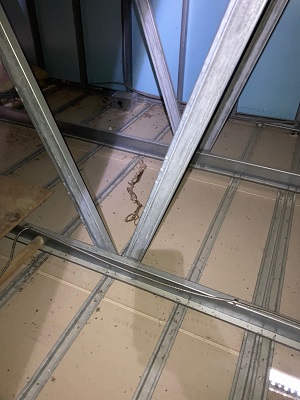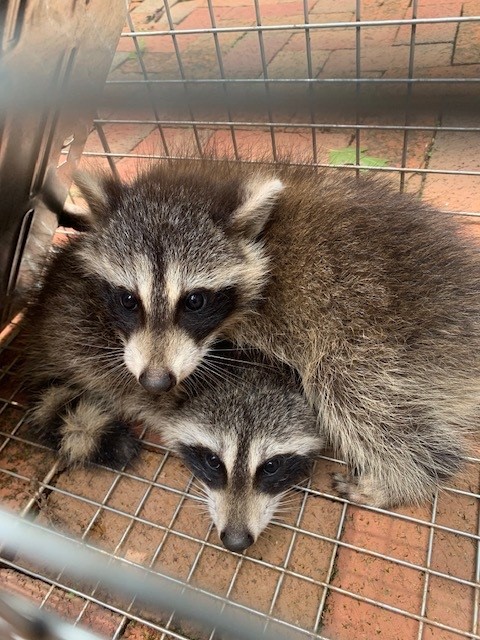
In metro-Atlanta, raccoons visit your yard for food, water, and/or shelter. The Atlanta area has ideal conditions for raccoons. Their natural habitat for raccoons is wooded areas close to water. Hollow trees are the natural den sites for raccoons. But they have adapted to urban, suburban, and agricultural areas.
Easily available food often attracts raccoons to your yard. Raccoons are omnivorous, eating both plants and animals. Plant foods include fruits, berries, nuts, acorns, corn, and other types of grain. Raccoons will happily eat garbage from trashcans, birdseed from birdfeeders, food waste in compost piles, fallen fruit from trees, or unattended pet food.
If raccoons find an area with available food and water, they will look for a safe place to den. Raccoons can den in areas under porch, in the garage, or inside attics.
Raccoon Removal Near You
The professionals at Critter Control have been trained in the most effective methods of removing raccoons from attics, walls, and chimneys , as it can sometimes be a lengthy process for raccoons in attic removal near you.
Raccoon Trapping in Atlanta
The best way to get rid of a raccoon is a trap. At Critter Control, we secure raccoon trap and set it away from anything you do not want to be destroyed. We place traps in an area where raccoons frequent. Because the raccoon trap needs to be checked, we do place it in a somewhat accessible location.
Critter Control uses only humane raccoon trapping techniques that are environmentally friendly and ecologically safe to remove raccoons from attics.In certain situations, we can install a raccoon excluder. We install it over the raccoon entry point. It allow the raccoon to leave, but it prevents their return.
Raccoon Control, Prevention, and Remediation
Preventative exclusion services are the most effective raccoon control. After raccoon removal, it is imperative to seal all entry points to prevent future entry. Ensuring you don’t create a home for raccoons outside your property will also help prevent attracting raccoons. However, habitat modification will become very important for prevention after dealing with a raccoon invasion.
Raccoon Exclusion in Atlanta Before and After
In this Atlanta home, a raccoon was able to climb under the roof line and create a hole in the siding. Raccoons can fit through a hole smaller than a grapefruit. We installed sheet metal over the large hole to prevent future nuisance wildlife problems.
| Raccoon Entry Point Before | Raccoon Exclusion Repair | Raccoon Exclusion Repair |
|---|---|---|
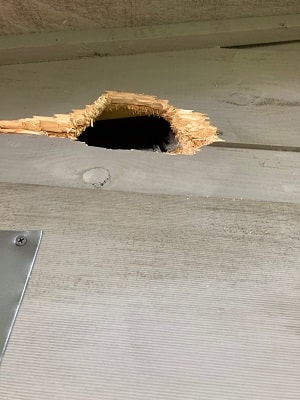 | 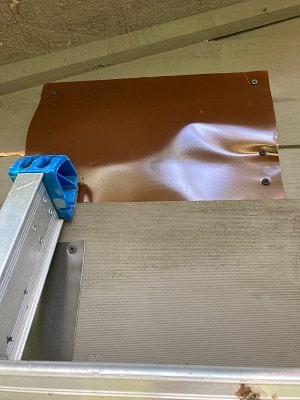 | 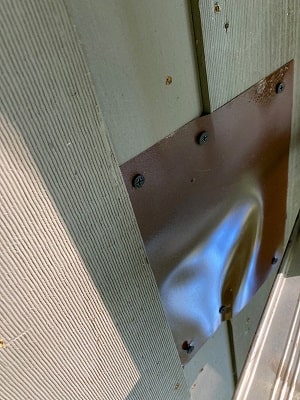 |
Raccoon in Attic Damage Repair
Generally, damage caused by raccoons in the attic includes building dens and creating latrine sites. Both activities destroy the attic’s insulation. Mother raccoons enter attics because it is a safe place to give birth. The females will use insulation and other materials to create a nest for the baby raccoons.
When they den in residential areas, raccoons create separate latrine sites. They consistently return to these locations to defecate and urinate. Raccoon droppings can spread raccoon roundworms (Baylisascaris procyonis), and raccoon urine can spread leptospirosis. Attempting to clean up after a raccoon can expose you to both diseases.
After removal and control, we will fix the raccoon damage. We remove denning materials and soiled insulation. We exterminate ectoparasites like ticks, fleas, and mites. We apply sanitization agents to disinfect areas where raccoons soiled. In extreme cases, we can replace and restore attic insulation.
